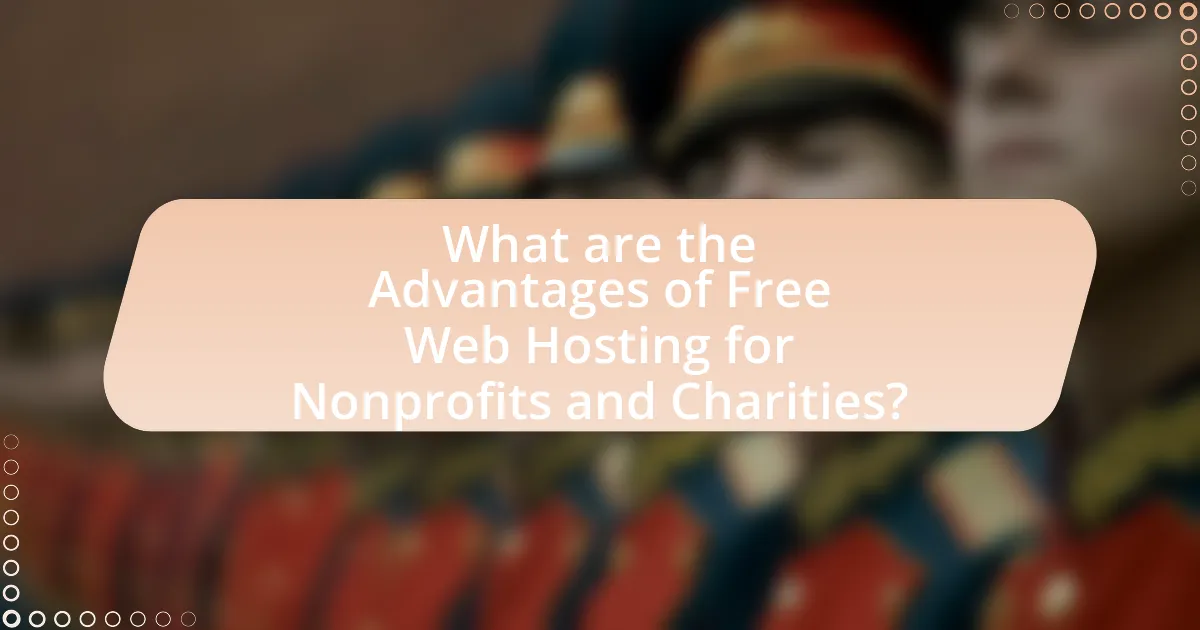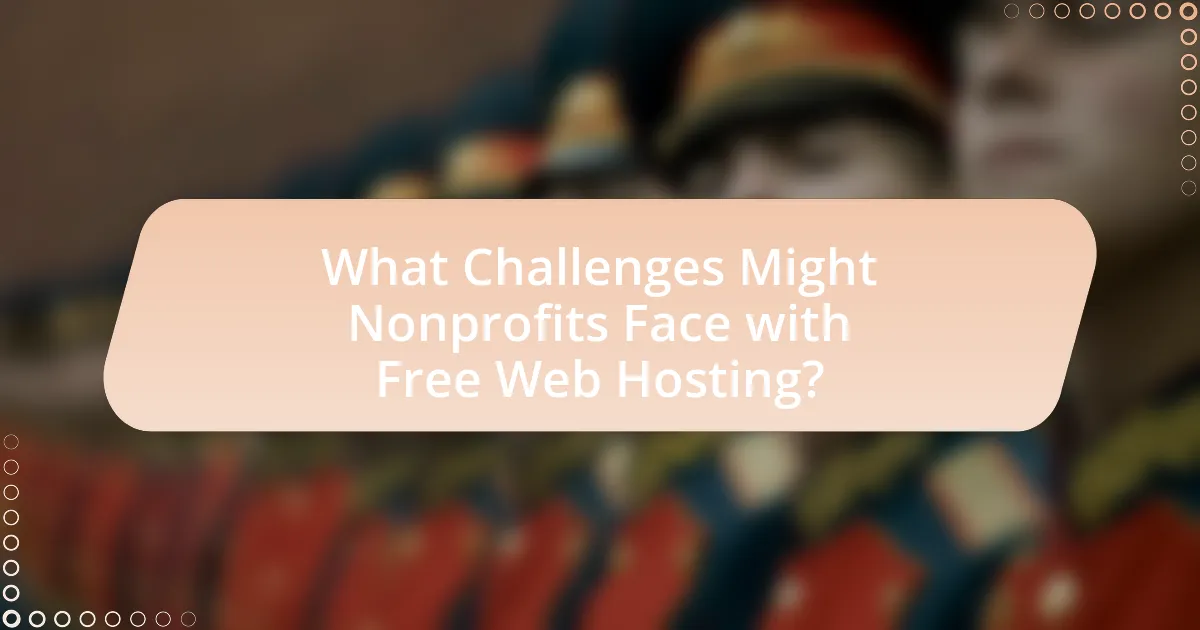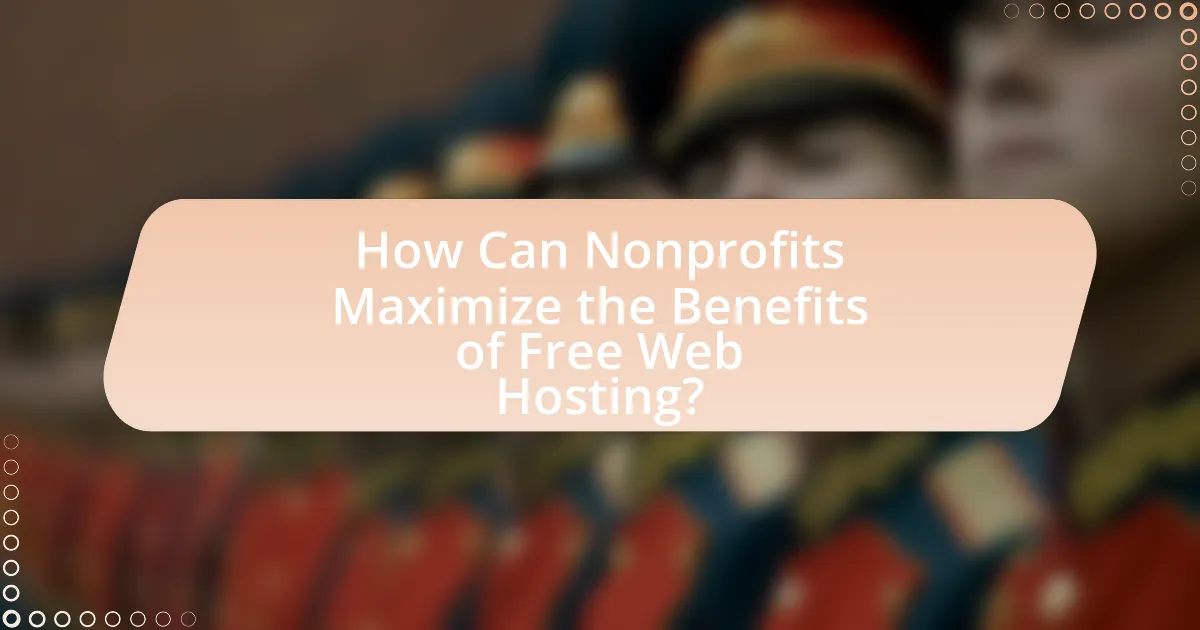Free web hosting presents significant advantages for nonprofits and charities by reducing operational costs, allowing these organizations to allocate more resources toward their missions. Key benefits include user-friendly tools for website creation, essential features like email accounts and basic analytics, and enhanced online visibility, which collectively facilitate greater outreach and support for their causes. However, nonprofits may also face challenges such as limited storage and bandwidth, lack of customer support, and potential security vulnerabilities. This article explores the various benefits and drawbacks of free web hosting for nonprofits, along with strategies to maximize its effectiveness while mitigating associated risks.

What are the Advantages of Free Web Hosting for Nonprofits and Charities?
Free web hosting offers significant advantages for nonprofits and charities, primarily by reducing operational costs. This financial relief allows these organizations to allocate more resources toward their missions and community services. Additionally, free web hosting often includes user-friendly tools and templates, enabling nonprofits to create and maintain their websites without requiring extensive technical expertise. Furthermore, many free hosting providers offer essential features such as email accounts and basic analytics, which help organizations communicate effectively and track their online engagement. These benefits collectively enhance the online presence of nonprofits and charities, facilitating greater outreach and support for their causes.
How can free web hosting benefit nonprofit organizations?
Free web hosting can significantly benefit nonprofit organizations by reducing operational costs, allowing them to allocate more resources toward their missions. Nonprofits often operate on limited budgets, and utilizing free web hosting services eliminates expenses associated with domain registration and server maintenance. For instance, organizations like the American Red Cross and Habitat for Humanity have leveraged free hosting platforms to enhance their online presence without incurring additional financial burdens. This cost-saving measure enables nonprofits to focus on fundraising, outreach, and community engagement, ultimately enhancing their impact and effectiveness in serving their causes.
What cost savings can nonprofits achieve with free web hosting?
Nonprofits can achieve significant cost savings with free web hosting by eliminating monthly hosting fees, which typically range from $5 to $100. This reduction in expenses allows nonprofits to allocate funds towards their core missions, such as community programs or outreach initiatives. Additionally, free web hosting often includes essential features like website builders and templates, further reducing the need for hiring web developers, which can cost hundreds to thousands of dollars. By utilizing free web hosting services, nonprofits can maintain an online presence without incurring substantial financial burdens, thereby maximizing their operational efficiency and impact.
How does free web hosting enhance online visibility for charities?
Free web hosting enhances online visibility for charities by providing them with a cost-effective platform to establish an online presence. This accessibility allows charities to create websites without financial barriers, enabling them to reach a broader audience. According to a 2021 report by the Nonprofit Technology Network, 70% of nonprofits that utilize online platforms see increased engagement and donations, demonstrating that a strong online presence directly correlates with visibility and support. By leveraging free web hosting, charities can effectively communicate their mission, share updates, and engage with potential donors, thereby increasing their overall visibility in the digital space.
What features are typically included in free web hosting services?
Free web hosting services typically include features such as limited storage space, bandwidth, and subdomain usage. These services often provide basic website builders, email accounts, and customer support, albeit with restrictions compared to paid hosting options. For instance, many free hosting providers offer a limited amount of disk space, usually ranging from 500 MB to 2 GB, and bandwidth that may cap at a few gigabytes per month. Additionally, users often receive a subdomain (e.g., yoursite.provider.com) instead of a custom domain, which can affect branding. These features are designed to accommodate small websites or personal projects, making them accessible for nonprofits and charities that may have budget constraints.
What types of support can nonprofits expect from free web hosting providers?
Nonprofits can expect several types of support from free web hosting providers, including basic website hosting services, technical assistance, and access to community resources. Basic website hosting services typically include storage space, bandwidth, and domain registration, allowing nonprofits to establish an online presence without financial burden. Technical assistance often comes in the form of customer support via email or chat, helping organizations troubleshoot issues and optimize their websites. Additionally, many free hosting providers offer access to community forums or knowledge bases, where nonprofits can find resources, tips, and best practices for managing their websites effectively.
How do storage and bandwidth limitations affect nonprofits using free web hosting?
Storage and bandwidth limitations significantly restrict nonprofits using free web hosting by hindering their ability to effectively manage and deliver content. Nonprofits often rely on their websites to share information, engage with donors, and promote events; however, limited storage can prevent them from uploading essential files, such as images and videos, which are crucial for effective communication. Additionally, bandwidth restrictions can lead to slow loading times or website downtime during peak traffic periods, negatively impacting user experience and potentially deterring visitors. According to a study by Google, 53% of mobile site visits are abandoned if a page takes longer than three seconds to load, highlighting the importance of adequate bandwidth for maintaining user engagement.

What Challenges Might Nonprofits Face with Free Web Hosting?
Nonprofits may face several challenges with free web hosting, including limited storage and bandwidth, which can hinder their ability to manage high traffic or large files effectively. Additionally, free hosting often lacks customer support, leaving organizations without assistance during technical issues. Security vulnerabilities are also a concern, as free hosting services may not provide adequate protection against cyber threats, potentially compromising sensitive donor information. Furthermore, the presence of ads on free hosting platforms can detract from a nonprofit’s professional image, making it harder to establish credibility with stakeholders. Lastly, nonprofits may encounter restrictions on customization and functionality, limiting their ability to create a tailored online presence that meets their specific needs.
What are the potential downsides of using free web hosting for charities?
Using free web hosting for charities can lead to several potential downsides, including limited resources, lack of customer support, and potential security vulnerabilities. Limited resources often manifest as restricted bandwidth and storage, which can hinder a charity’s ability to effectively reach its audience. The absence of customer support can result in prolonged downtime or technical issues that remain unresolved, negatively impacting the charity’s online presence. Additionally, free hosting services may not prioritize security, making charities more susceptible to data breaches or cyberattacks, which can compromise sensitive donor information. These factors collectively can undermine the operational effectiveness and credibility of a charity.
How can limited features impact a nonprofit’s online presence?
Limited features can significantly hinder a nonprofit’s online presence by restricting its ability to engage with supporters and effectively communicate its mission. For instance, a lack of customizable design options may result in a generic website that fails to capture the organization’s unique identity, leading to decreased visitor retention. Additionally, limited functionality, such as inadequate donation processing tools or absence of social media integration, can reduce the organization’s capacity to raise funds and connect with a broader audience. Research indicates that nonprofits with more robust online features experience higher engagement rates, as they can provide a more interactive and user-friendly experience for potential donors and volunteers.
What security concerns should nonprofits be aware of with free web hosting?
Nonprofits should be aware that free web hosting often lacks robust security measures, making them vulnerable to data breaches and cyberattacks. Many free hosting services do not provide SSL certificates, which encrypt data transmitted between the website and its users, exposing sensitive information. Additionally, free hosting platforms may have limited support for security updates and patches, leaving websites susceptible to known vulnerabilities. According to a 2021 report by Cybersecurity Ventures, 60% of small businesses, including nonprofits, that experience a cyberattack go out of business within six months, highlighting the critical need for adequate security measures.
How can nonprofits mitigate the risks associated with free web hosting?
Nonprofits can mitigate the risks associated with free web hosting by implementing robust security measures and regularly backing up their data. By utilizing secure passwords, enabling two-factor authentication, and choosing reputable free hosting providers with good security protocols, nonprofits can reduce vulnerabilities. Additionally, conducting regular audits of their website for malware and ensuring that all software is up to date further enhances security. According to a 2021 report by the Cybersecurity and Infrastructure Security Agency, organizations that adopt these practices can significantly decrease the likelihood of data breaches and cyberattacks.
What best practices should nonprofits follow when selecting a free web hosting service?
Nonprofits should prioritize reliability, support, and features when selecting a free web hosting service. Reliability ensures that the website remains accessible to users, which is critical for maintaining engagement and trust. Support is essential, as nonprofits may require assistance with technical issues; thus, a service with responsive customer support can significantly enhance the user experience. Features such as bandwidth, storage, and ease of use should also be evaluated, as they directly impact the website’s performance and functionality. According to a 2021 survey by TechSoup, 70% of nonprofits reported that website uptime and support were crucial factors in their hosting decisions, highlighting the importance of these best practices.

How Can Nonprofits Maximize the Benefits of Free Web Hosting?
Nonprofits can maximize the benefits of free web hosting by strategically utilizing the available resources and features to enhance their online presence. They should focus on optimizing website content for search engines, ensuring that their site is user-friendly and accessible, and leveraging social media integration to drive traffic. Additionally, nonprofits can take advantage of any promotional tools offered by the hosting provider, such as email marketing services or analytics, to better understand their audience and improve engagement. Research indicates that organizations with a strong online presence can increase donations by up to 30%, highlighting the importance of effectively utilizing free web hosting services.
What strategies can nonprofits implement to enhance their web presence?
Nonprofits can enhance their web presence by optimizing their websites for search engines, utilizing social media platforms, and creating engaging content. Search engine optimization (SEO) improves visibility in search results, which is crucial as 93% of online experiences begin with a search engine. Social media platforms allow nonprofits to reach wider audiences; for instance, 79% of the U.S. population uses social media, providing a significant opportunity for engagement. Additionally, creating high-quality, relevant content can attract and retain visitors, as content marketing generates three times more leads than traditional marketing methods.
How can nonprofits effectively utilize social media alongside free web hosting?
Nonprofits can effectively utilize social media alongside free web hosting by integrating their online presence to enhance visibility and engagement. By using free web hosting services, nonprofits can create a professional website that serves as a central hub for information, while social media platforms can drive traffic to this site. For instance, organizations can share updates, events, and fundraising campaigns on social media, linking back to their website for more details. This strategy not only increases website visits but also fosters community interaction and support. According to a 2021 report by the Nonprofit Technology Network, 70% of nonprofits reported that social media significantly improved their outreach efforts, demonstrating the effectiveness of this combined approach.
What content strategies can improve engagement for nonprofits using free web hosting?
Nonprofits using free web hosting can improve engagement by implementing targeted storytelling, utilizing social media integration, and creating interactive content. Targeted storytelling allows nonprofits to connect emotionally with their audience, showcasing real-life impact through narratives that resonate with supporters. Social media integration enhances visibility and encourages sharing, as platforms like Facebook and Twitter can amplify reach and foster community interaction. Additionally, interactive content such as polls, quizzes, and donation drives can actively involve users, making them feel part of the mission. According to a study by the Content Marketing Institute, organizations that prioritize storytelling see a 22% increase in engagement, demonstrating the effectiveness of these strategies.
What are some common troubleshooting tips for nonprofits using free web hosting?
Common troubleshooting tips for nonprofits using free web hosting include checking server uptime, ensuring domain name settings are correct, and verifying that website files are properly uploaded. Nonprofits should monitor server uptime using tools like UptimeRobot to ensure their site is accessible. Correct domain name settings can be confirmed through the hosting provider’s control panel, ensuring that DNS records point to the correct server. Additionally, nonprofits should use FTP clients to verify that all website files are uploaded correctly and that there are no missing or corrupted files. These steps help maintain website functionality and accessibility, which is crucial for nonprofit operations.
How can nonprofits address technical issues with their free web hosting service?
Nonprofits can address technical issues with their free web hosting service by utilizing available support resources, such as forums, help centers, and customer service provided by the hosting provider. Many free web hosting services offer documentation and community support that can help troubleshoot common problems. For instance, organizations can access FAQs or user guides that detail solutions to frequent issues, which can significantly reduce downtime and improve website functionality. Additionally, nonprofits can engage with online communities or social media groups focused on web hosting to seek advice and share experiences, enhancing their problem-solving capabilities.
What resources are available for nonprofits to learn more about optimizing free web hosting?
Nonprofits can access various resources to learn about optimizing free web hosting, including online guides, webinars, and community forums. Websites like TechSoup provide comprehensive articles and resources specifically tailored for nonprofits, focusing on best practices for utilizing free hosting services effectively. Additionally, platforms such as WordPress.org offer tutorials and forums where nonprofits can learn about optimizing their websites for performance and user experience. Nonprofit Technology Network (NTEN) also hosts webinars and workshops that cover web hosting optimization strategies, ensuring that organizations can maximize their online presence without incurring costs.